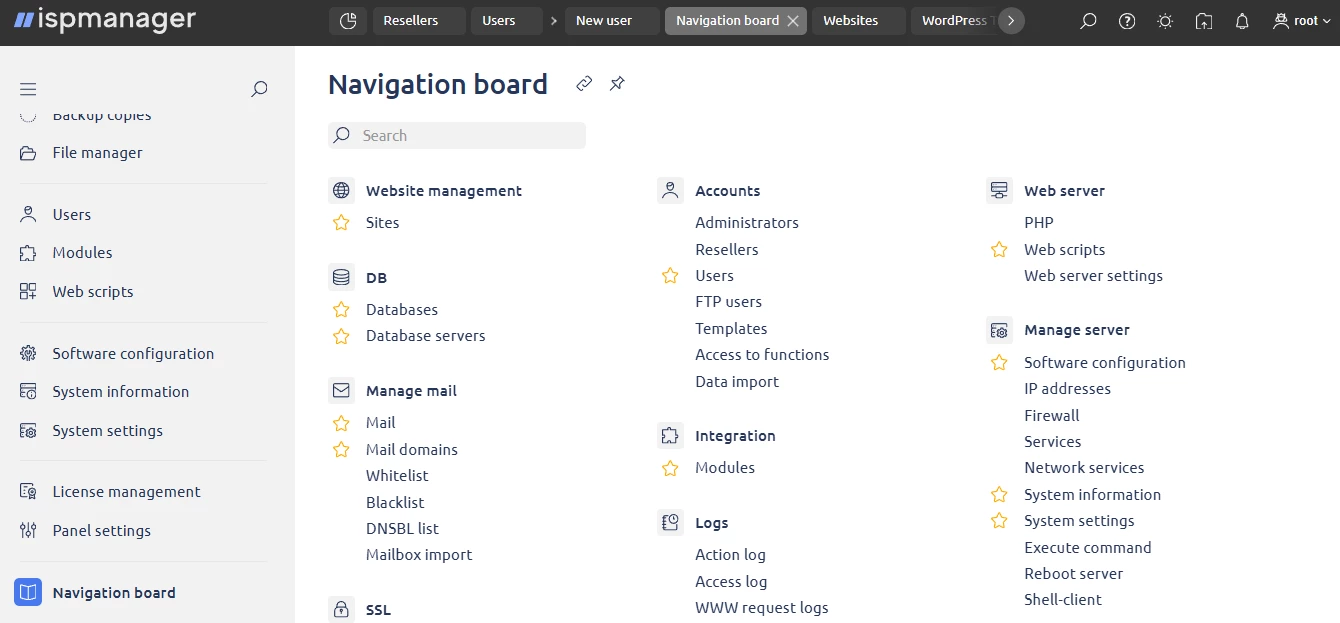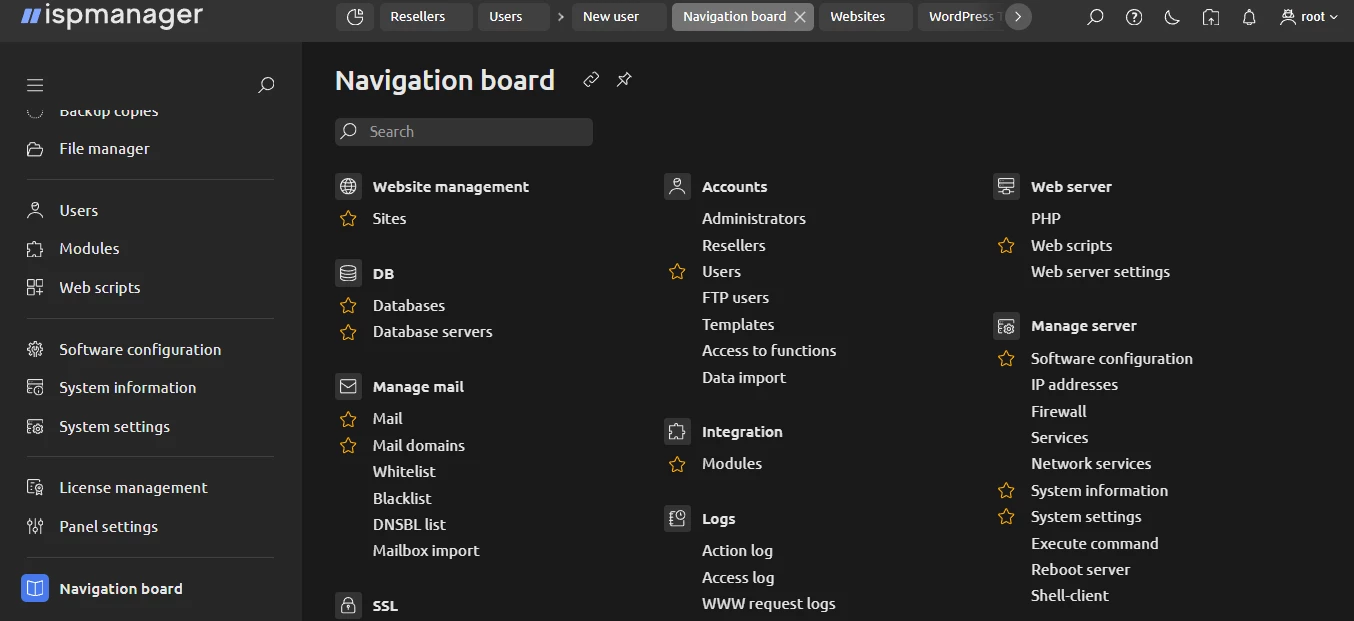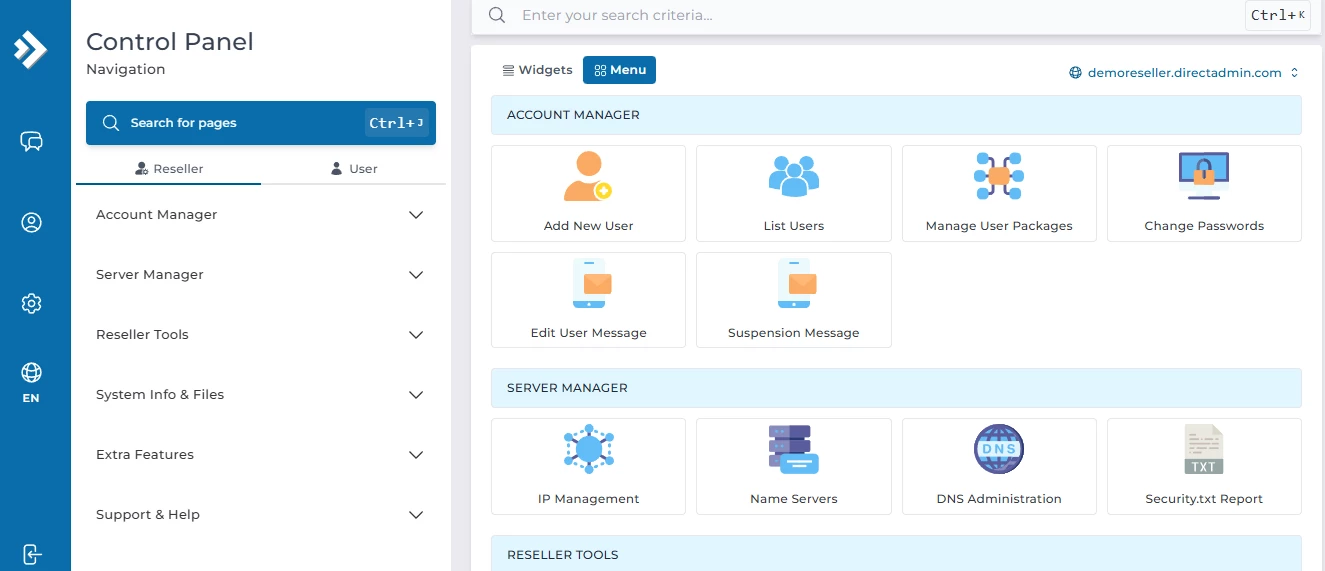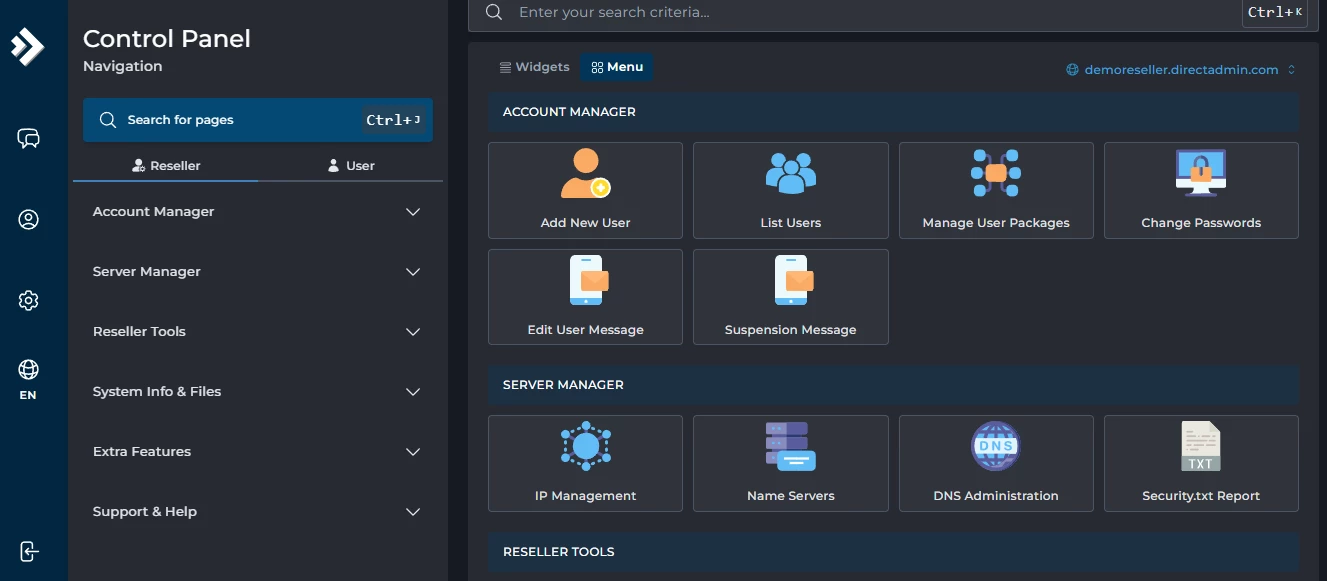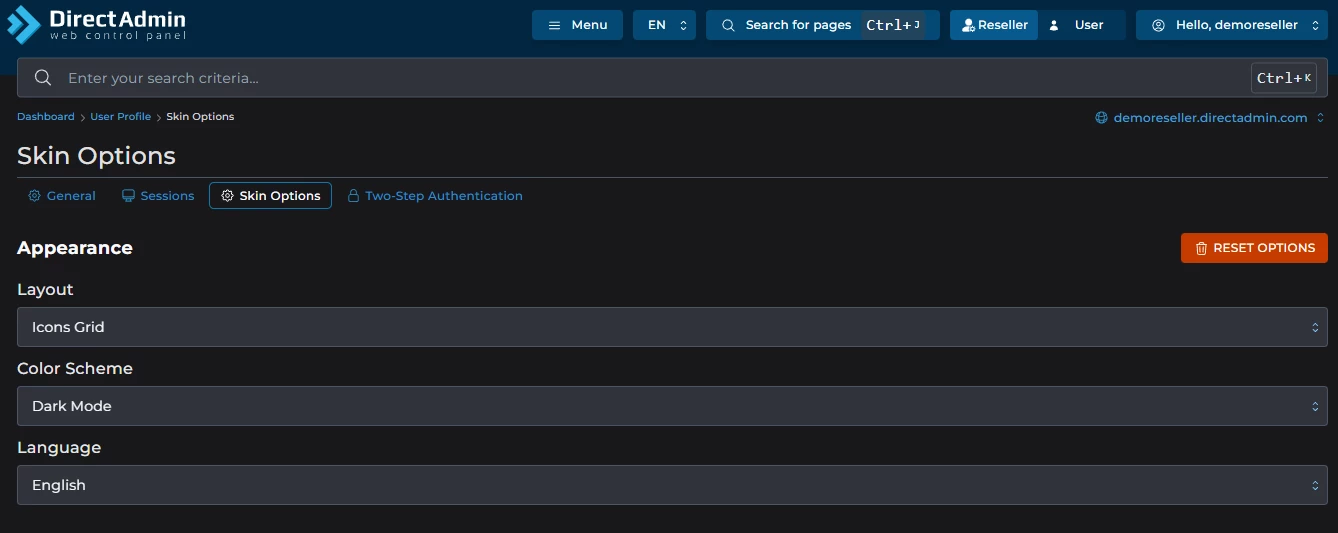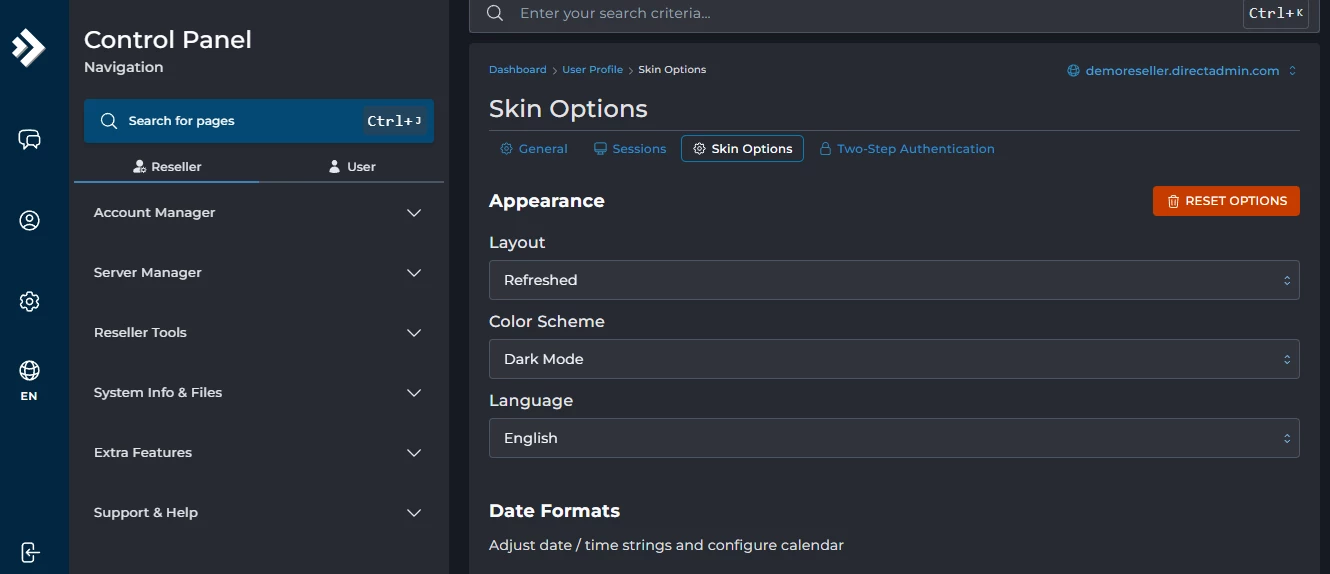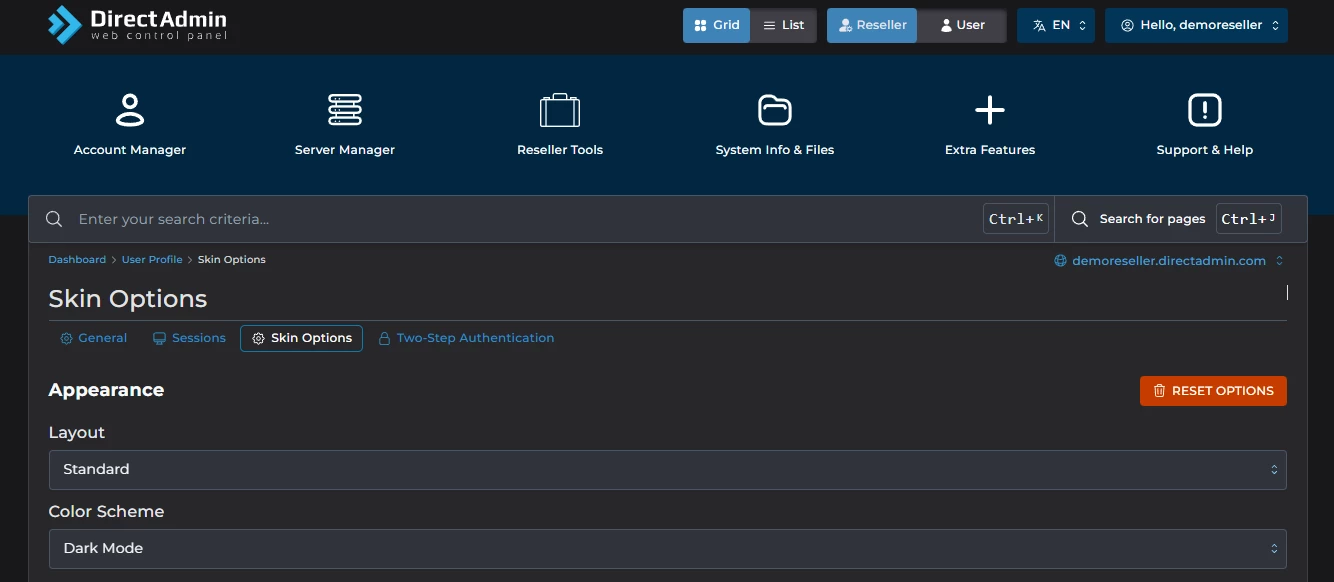If you aren't a seasoned system administrator comfortable managing servers through the command line, chances are you rely on a hosting control panel. And with good reason! Control panels make it easy to manage websites, servers, email, DNS, backups, and security without deep technical knowledge.
But as industry giants like cPanel and Plesk continue raising prices, more hosting companies and individual users are exploring alternatives. Two popular options you’ll often see recommended in 2026 are DirectAdmin and ispmanager, both lightweight and reliable.
In this article, we’ll provide an honest comparison of DirectAdmin vs ispmanager, based on real-world use cases:
- For hosting providers: Are these panels suitable for shared hosting environments? Should you bundle them with VPS plans?
- For personal and business projects: Which solution works better for powering your apps, websites, or client infrastructure?
Let’s see how these two stack up!
| Ease of use | ||
| Functionality | ||
| Security | ||
| Resource efficiency | ||
| Cost |
DirectAdmin vs ispmanager: Feature Overview
Supported OS
Minimum hardware requirements
Security features
Antivirus
Spam protection
Backups
Web server
Programming languages/frameworks
Email management
DBMS
CMS
Website builder
Automated certificate management for Let's Encrypt SSL certificates
Max recommended accounts per panel
Billing system integration
White label
Roles and access permissions
Updates
Interface
Language support
Support
ispmanager: Quick Overview
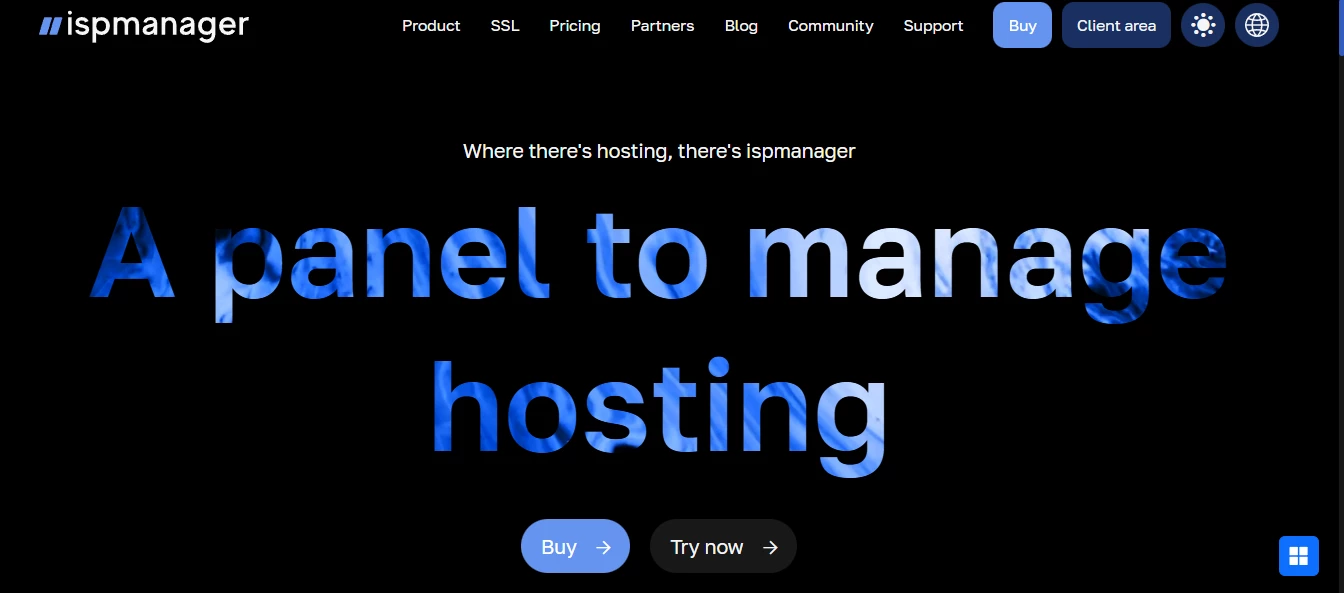
ispmanager is a modern, lightweight hosting control panel built to balance power with simplicity. It offers a clean interface, fast performance, strong security tools, and direct integration with popular web stacks and hosting automation systems. Thanks to an intuitive UI and detailed documentation, it’s equally suitable for beginners and experienced administrators managing VPS or shared hosting environments. One of its strong advantages is reliable, responsive technical support included with all plans.
Pros
- Intuitive beginner-friendly interface
- Lightweight and resource-efficient
- Smooth VPS and multi-user management
- Strong documentation and responsive support
- Active development and new features introduced regularly
Cons
- Smaller plugin ecosystem compared to legacy vendors
- No WordPress Toolkit as in cPanel or Plesk
DirectAdmin: Quick Overview
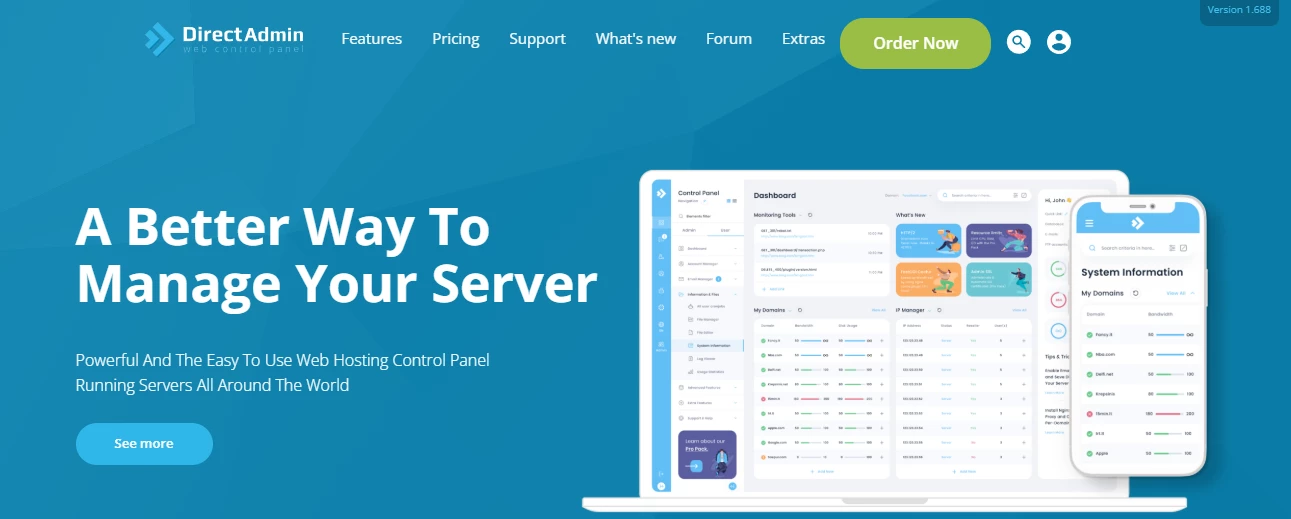
DirectAdmin is a reputable hosting control panel known for stability, low resource usage, and a clean, functional UI. Designed with performance in mind, it remains a popular choice among hosting providers looking for a cost-efficient alternative to legacy options. While feature-rich and reliable, some workflows and UI elements may feel more unintuitive and can require slightly more familiarity for less technical users.
Pros
- Lightweight and stable
- Affordable licensing and predictable pricing
- High level of customization allowed
- 10+ languages out of the box (there's a built-in translation system that allows users to add/update more translations; languages that are, at least, 80% translated are bundled with DirectAdmin).
Cons
- No WordPress Toolkit
- May be difficult to start using for non-tech users
ispmanager vs DirectAdmin: Interface & Usability
Interface
Both ispmanager and DirectAdmin offer a modern interface with conveniences users expect in 2026. Each provides a built-in search bar, supports both light and dark themes, and can follow your system theme.
DirectAdmin also allows interface customization through multiple skins, giving users flexibility in layout and appearance. There’s a DirectAdmin tutorial for using skins.
Usability
When it comes to everyday usability, ispmanager is generally more beginner-friendly. The dashboard highlights the most common tasks right away, including:
- create a site;
- create a WordPress site;
- create database;
- create mailbox;
- create a mail domain;
- create a DNS domain…
and so on, including rebooting server and launching a shell client.
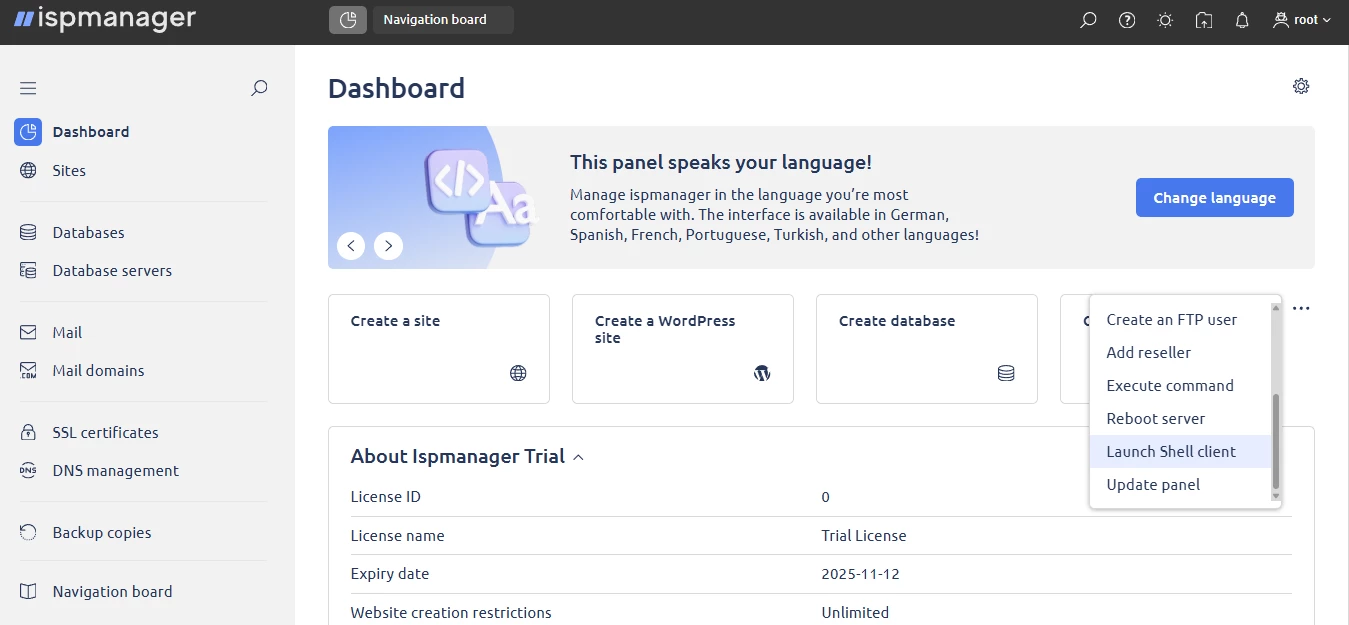
This means many users (those new to server administration included) can complete tasks directly from the home screen without clicking through menus. ispmanager also supports tabbed navigation, similar to a web browser, that lets you switch between multiple open sections. It’s a small feature that makes multitasking — for example, editing DNS, creating a database, and managing files at the same time — faster and more convenient.
Combined with the clean layout and accessible quick actions, ispmanager often feels more intuitive than panels like cPanel or Plesk. If you'd like to evaluate that yourself, we’ve published detailed comparisons here:
Beyond the quick-action dashboard, ispmanager also provides a Navigation Board that displays all available tools and settings in one place. The board makes it easy to find anything in a click or two.
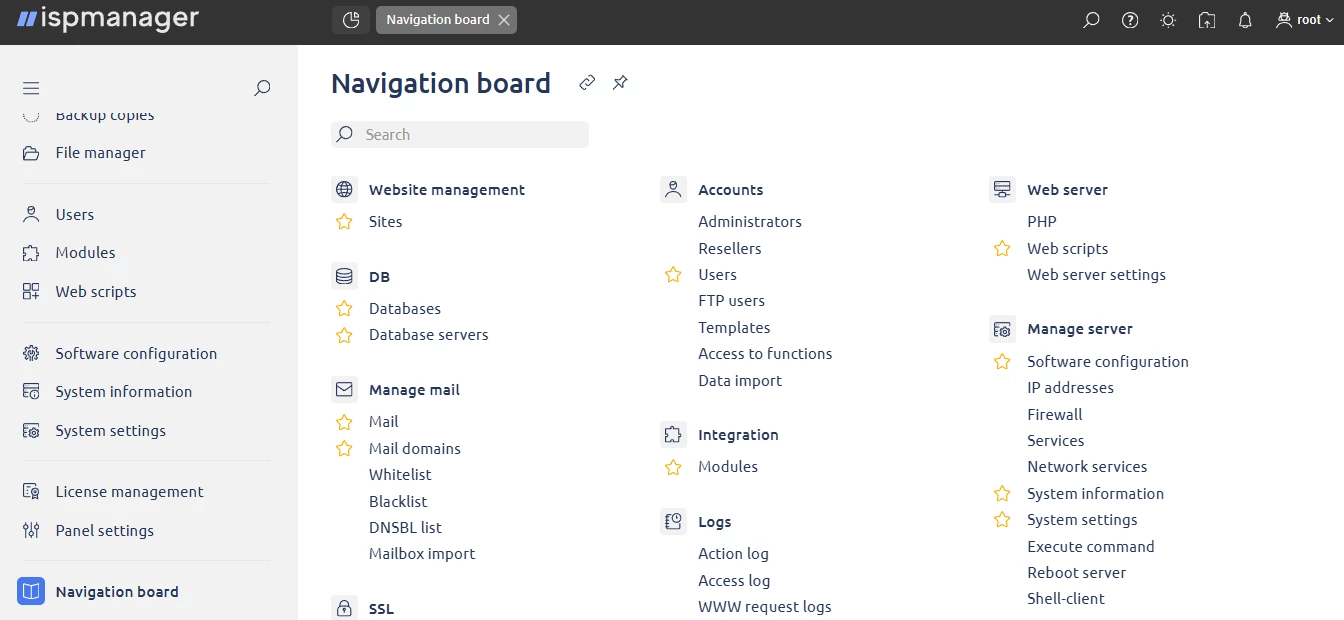
DirectAdmin likewise includes a navigation board, but it organizes tools into broader categories. For example, items such as databases, SSL certificates, and PHP settings are all grouped under Account Management. Other categories — such as Advanced Features or Extra Features — may not be immediately clear to first-time users. Important tools like 2FA, backups, Roundcube, or phpMyAdmin may therefore take longer to locate until you learn how to use DirectAdmin.
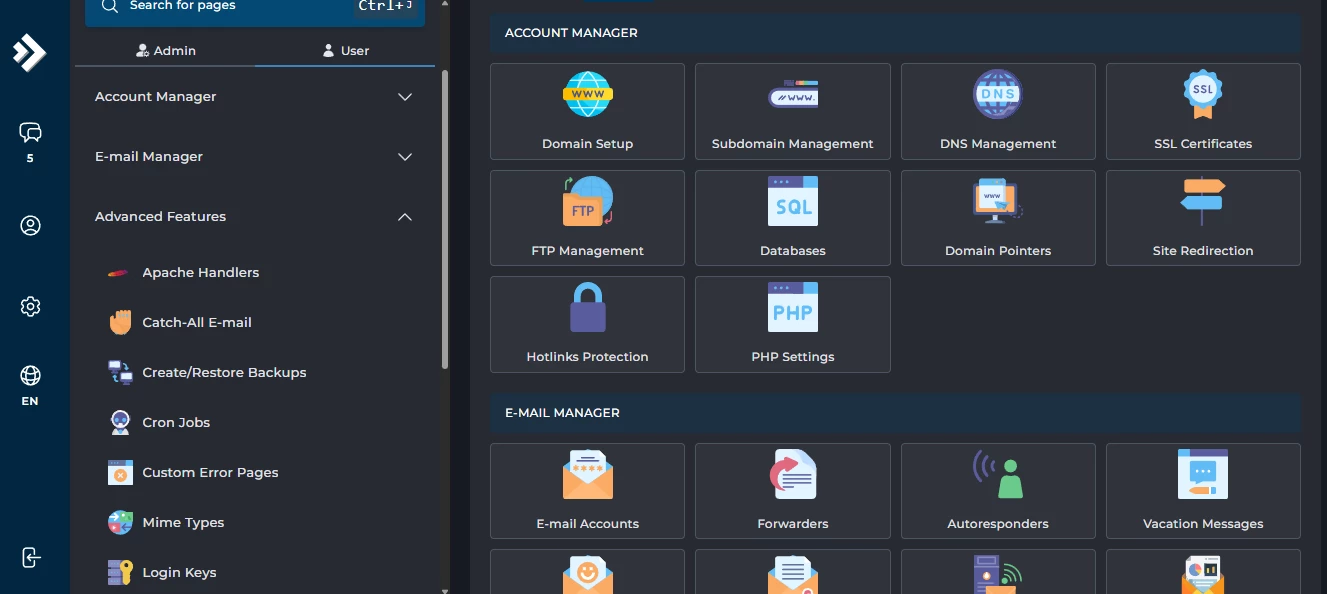
One can explore all account management features in the DirectAdmin demo.
Final thoughts on usability and interface
DirectAdmin offers a modern UI and a good level of customization, but it typically requires more time and technical familiarity to master — that is a point mentioned in most DirectAdmin reviews you find online. ispmanager, on the other hand, focuses on clarity and quick access to common tasks. This makes it a smoother starting point for beginners and web professionals who value a straightforward workflow.
ispmanager vs DirectAdmin: Performance & Functionality
When it comes to performance, both ispmanager and DirectAdmin are widely recognized as lightweight, fast, and resource-efficient control panels. They deliver stable performance on modest server configurations and include core hosting-management functionality such as:
- Domain and DNS management;
- Email setup and security controls;
- Database creation and administration;
- File management;
- SSL configuration.
WordPress & CMS management
Both panels support popular CMS platforms, but the experience differs. DirectAdmin provides CMS installation capabilities, though, as you may read in many DirectAdmin reviews, its WordPress setup is less intuitive and more hands-on.
ispmanager, by contrast, recently introduced a one-click WordPress installer that handles configuration automatically. Users simply select a domain and theme, while the panel handles the rest. This makes the process beginner-friendly and faster for small agencies launching multiple sites.
Billing & automation
Both platforms expose full functionality via API, enabling integration with automation and billing systems. However, ispmanager currently provides a wider range of ready-made billing integrations, including HostBill, Blesta, and BILLmanager.
Hosting plan configuration & resource limits
Both ispmanager and DirectAdmin allow administrators to set custom hosting plans with limits on storage, traffic, domains, mailboxes, and other key parameters. ispmanager also offers fine-grained access controls and resource limits, including:
- Limits on database queries;
- Shell access settings;
- Granular task-level permissions.
These tools may benefit advanced users, agencies, and resellers seeking precise control over hosting plans and user roles.
Documentation & ecosystem
In terms of ecosystem support, DirectAdmin is a capable panel but has a narrower set of supported add-ons and server environments. For example, it does not support CloudLinux, while ispmanager does.
Like any commercial hosting control panel, DirectAdmin provides documentation and an active community forum. However, in DirectAdmin reviews, users occasionally note that community resources are often needed to fill documentation gaps. ispmanager’s documentation, in turn, has grown into a comprehensive, user-friendly knowledge base over the past several years.
There are also a series of ispmanager and DirectAdmin tutorials available on YouTube. Both are pretty outdated, though.
Final thoughts on functionality
Overall, both panels are powerful and performant. DirectAdmin excels as a fast, efficient control panel suited to technically experienced users and hosting professionals who prefer hands-on configuration.
ispmanager takes a more versatile, user-focused approach, aiming to serve both individual VPS users and full-scale shared hosting environments with a combination of automation tools, detailed resource controls, and streamlined workflows.
ispmanager vs DirectAdmin for Different Use Cases
Now that we’ve reviewed key features and performance aspects, let’s look at how ispmanager and DirectAdmin compare in practical, real-world scenarios.
ispmanager vs DirectAdmin for hosting providers
Hosting companies typically use a control panel in two ways:
- to power shared hosting services, and
- to bundle with VPS plans.
Shared hosting
Both ispmanager and DirectAdmin are strong alternatives to cPanel for shared hosting, particularly because neither panel limits the number of accounts based on license type as cPanel does.
Both panels offer:
- Custom hosting plan creation;
- Resource allocation and quotas;
- Role-based access management.
However, ispmanager may offer a smoother operational experience for providers who need clear, accessible documentation for onboarding customers. Its knowledge base has expanded significantly in recent years, which can help support teams and end users alike.
VPS hosting
When offering VPS hosting with a control panel option, both ispmanager and DirectAdmin are valid choices.
DirectAdmin is more widely recognized globally and has a loyal community, meaning some customers may be looking for DirectAdmin VPS hosting specifically.
ispmanager is less known in some regions but provides strong go-to-market support for hosting partners, including:
- ready-made marketing materials;
- landing pages and promotional assets;
- blog articles and sales guides.
This can simplify the rollout and help hosting companies actively promote the panel. You can find all the details in this practical guide for hosting providers on how to quickly get their first sales with ispmanager.
Overall, both control panels work well for VPS plans and can serve as lightweight, budget-friendly alternatives to cPanel and Plesk.
ispmanager vs DirectAdmin for personal/business projects
If you’re choosing a control panel for your own project (whether for a personal website, an agency project, or a business application), you will likely encounter both options across different hosting providers.
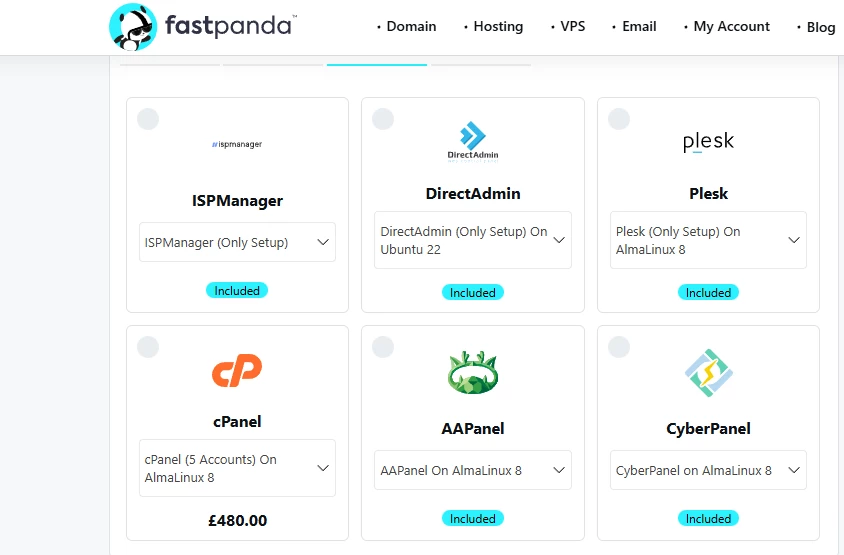
Some hosting providers offer ispmanager VPS hosting, but do not include DirectAdmin.
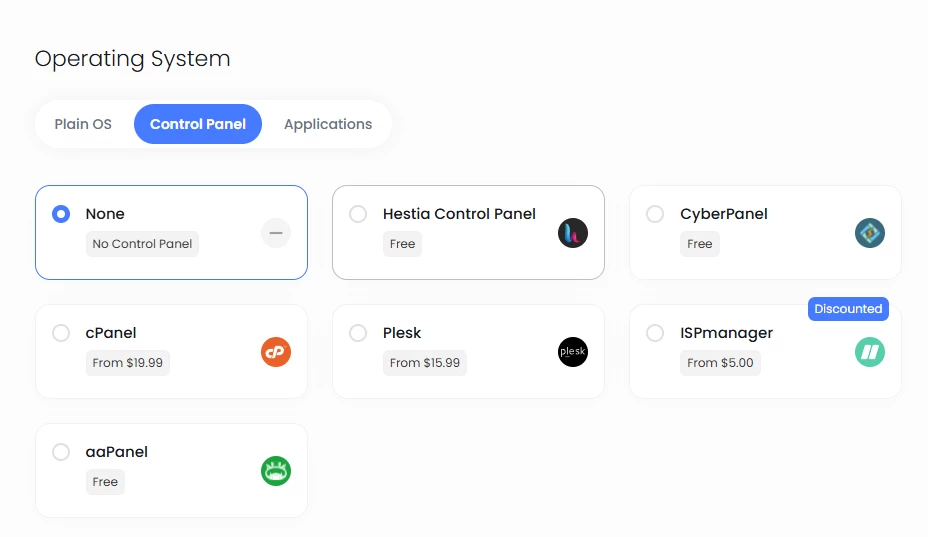
Others offer DirectAdmin VPS hosting, but not ispmanager.
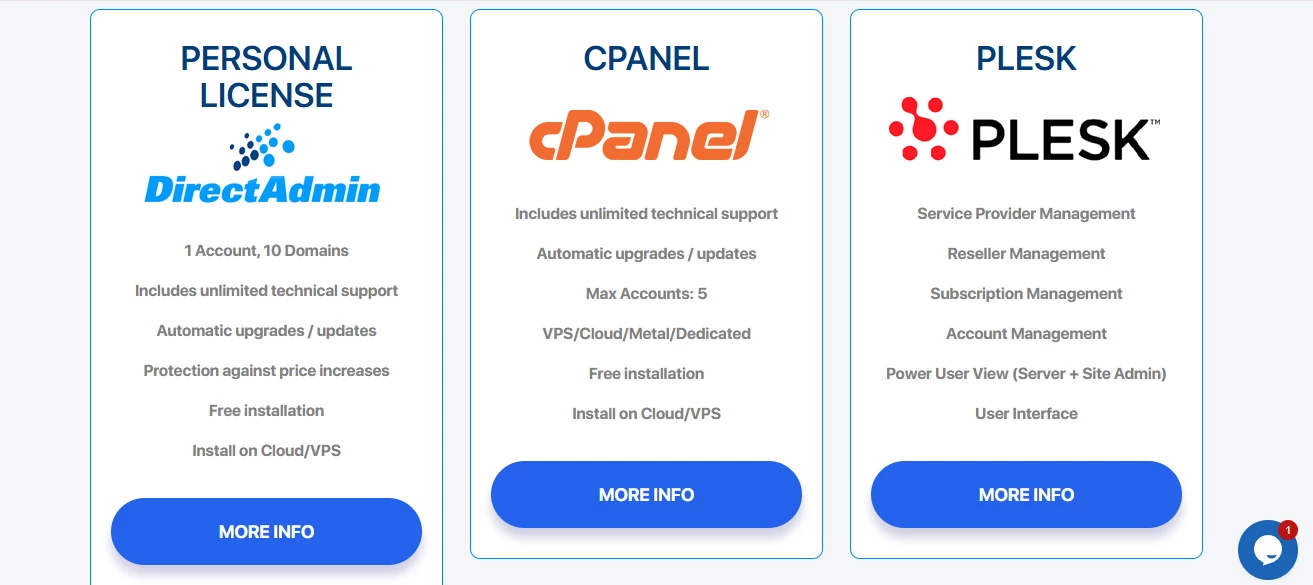
Functionally, both panels can effectively power personal and business environments. The key difference is user experience and skills required:
- DirectAdmin is powerful, but it may feel less intuitive to those without server-management experience.
- ispmanager is generally easier for beginners and small teams thanks to its straightforward UI and guidance tools.
Support availability may also matter for smaller customers. DirectAdmin's ticket support system depends on the license type, whereas ispmanager includes 24/7 support with all commercial plans. This makes it a helpful safeguard for solo users and small businesses who may not have in-house technical staff.
In short: both panels are capable for personal or client projects, but ispmanager may be faster to adopt for users without deep sysadmin experience.
ispmanager vs DirectAdmin: Pricing
Pricing is often one of the most sensitive factors when choosing a hosting control panel. Migrating an entire server fleet from one panel to another is complex and time-consuming, whis is why long-term price stability matters just as much as the current subscription cost.
Both ispmanager and DirectAdmin pricing structures position them as cost-effective alternatives to cPanel and Plesk (their license costs are generally 2-3 times lower than the cost of cPanel's and Plesk's licenses). Importantly, neither ispmanager nor DirectAdmin has introduced price increases in the past two years. This is something that makes them appealing in contrast with industry leaders that have implemented regular price adjustments.
From a value standpoint, both ispmanager and DirectAdmin cost several times less than Plesk or cPanel, which makes them suitable for individuals, small hosting businesses, and larger providers that want to scale.
One notable difference related to ispmanager and DirectAdmin costs is support availability:
- ispmanager licenses (all) include full technical support.
- The cheapest DirectAdmin licenses (Personal Plus) offer installation-related support only.
For solo developers, small businesses, and hosting providers alike, this distinction may influence the total cost of ownership, especially when hands-on assistance is required.
Final Verdict: DirectAdmin vs ispmanager, Which Is Better?
Both ispmanager and DirectAdmin are fast, lightweight, and feature-rich control panels that represent strong alternatives to cPanel and Plesk. The “better” option ultimately depends on your use case and technical background.
ispmanager stands out for its clean, intuitive interface, extensive documentation, and consistent support coverage across all paid plans. It is designed to be accessible for beginners while still flexible and capable enough for advanced users and hosting providers.
DirectAdmin, in turn, is an efficient panel with a loyal user base and a strong reputation among technically experienced administrators. It offers customization options and a modern UI, though new users may find that it requires more time to learn how to use DirectAdmin properly.
